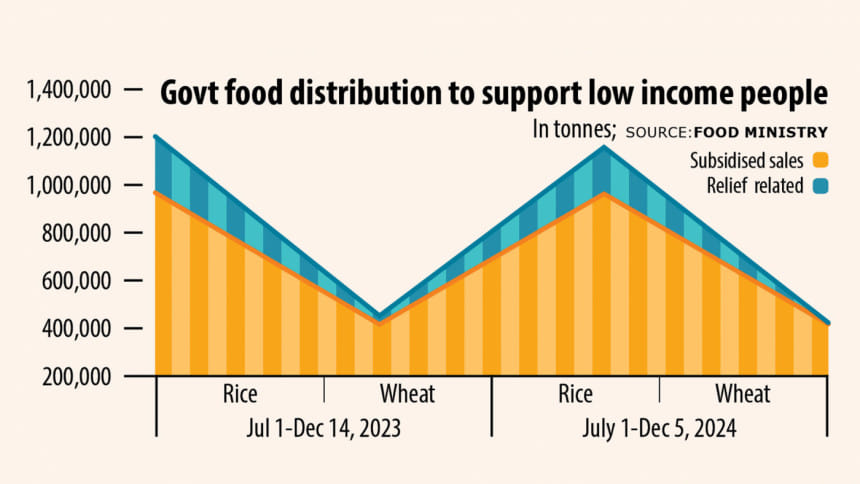Food distribution falls despite persistent inflation

Despite the fact that the population has been reeling from heightened inflationary pressures over the past two years, public food distribution under various social protection schemes fell by about 6 percent year-on-year in the first half of the current fiscal year.
Public agencies, including the Directorate General of Food and the Ministry of Disaster Management and Relief, only distributed about 13.78 lakh tonnes of rice and wheat through food distribution programmes until December 5, according to data from the food ministry.

This was a marked decrease from the 14.63 lakh tonnes distributed by state agencies between July 1 and December 14 of the previous fiscal year.
The Awami League government, which was ousted by a mass uprising on August 5, had cut food distribution plans this fiscal year, lowering its target from 33.56 lakh tonnes in FY24 to 30.3 lakh tonnes in FY25. Economists said it was an illogical decision, especially in light of soaring food inflation.
Inflation hit a four-month-high of 11.38 percent in November, while food inflation soared to 13.80 percent from 12.66 percent in October, according to data from the Bangladesh Bureau of Statistics.
Given the cost-of-living crisis, scaling up public food distribution programmes for the poor and the vulnerable is the need of the hour. But the government appears to be shying away from this task, according to experts.
"Low distribution is not logical as this year's economic situation is more dire than that last year," said M Asaduzzaman, former research director at the Bangladesh Institute of Development Studies (BIDS).
"Inflation is severely hurting low-income people," he said, urging the government to increase the target.
Asaduzzaman also raised questions about government data on food distribution.
"How can we believe the food distribution data when everything else was based on falsehoods?" he asked, referring to the recent white paper on the state of the economy, which revealed that the immediate past government had been fudging the numbers to prop up a false narrative of economic growth.
"It is clear that the prices of food grains have increased. People from all walks of life are suffering now," he said.
Data shows that the decline in food distribution was mostly linked to reduced grain transfers under the Food for Work (FFW) programme.
The relief and disaster management ministry distributed 52,742 tonnes under the FFW programme last year. This year, it has managed to provide only 68 tonnes.
"The government is probably facing a stock crisis," Asaduzzaman said.
Echoing those sentiments, Mohammad Yunus, a research director at the BIDS, said there is a close relationship between food procurement and distribution in Bangladesh.
"The government needs to emphasise the procurement process as well as timely imports," he said.
Usually, the authorities concerned cannot procure food grain timely, leading to low stocks.
"It seems officials cannot get the prices that they decide upon in procurement meetings," Yunus said.
He added that changing market dynamics also had an impact. "The market pattern has changed now. Earlier, farmers used to sell their grains immediately. Now they take time."
The government should take accurate and timely decisions to avoid any untoward situation, he added.
"To boost stocks, the government should focus on importing food grains when global prices are supposed to reduce," he said.
Claiming that the data was incomplete, Md Abdus Salam, director of Supply, Distribution and Marketing Department (Current Charge) at the Directorate of Food, said overall food distribution may increase when data is completely updated.
Following the mass uprising in July, many dealers of the Open Market Sales (OMS) programme went into hiding, hampering the initiative, he said.
About the FFW programme, Salam said it may have been hindered due to the disruption of local government protocols.
However, he claimed they had increased distribution programmes while focusing on flood-affected districts. "No channels were left out of operation. The distribution will increase this year," he said.

 For all latest news, follow The Daily Star's Google News channel.
For all latest news, follow The Daily Star's Google News channel. 



Comments